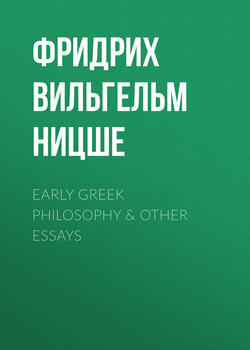Early Greek Philosophy & Other Essays

Реклама. ООО «ЛитРес», ИНН: 7719571260.
Оглавление
Фридрих Вильгельм Ницше. Early Greek Philosophy & Other Essays
TRANSLATOR'S PREFACE
THE GREEK STATE
THE GREEK WOMAN
ON MUSIC AND WORDS
HOMER'S CONTEST
THE RELATION OF SCHOPENHAUER'S PHILOSOPHY TO A GERMAN CULTURE
PHILOSOPHY DURING THE TRAGIC AGE OF THE GREEKS
PREFACE
LATER PREFACE
1
2
3
4
5
6
7
8
9
10
11
12
13
14
15
16
17
18
19
Notes for a Continuation
ON TRUTH AND FALSITY IN THEIR ULTRAMORAL SENSE
Отрывок из книги
We moderns have an advantage over the Greeks in two ideas, which are given as it were as a compensation to a world behaving thoroughly slavishly and yet at the same time anxiously eschewing the word "slave": we talk of the "dignity of man" and of the "dignity of labour." Everybody worries in order miserably to perpetuate a miserable existence; this awful need compels him to consuming labour; man (or, more exactly, the human intellect) seduced by the "Will" now occasionally marvels at labour as something dignified. However in order that labour might have a claim on titles of honour, it would be necessary above all, that Existence itself, to which labour after all is only a painful means, should have more dignity and value than it appears to have had, up to the present, to serious philosophies and religions. What else may we find in the labour-need of all the millions but the impulse to exist at any price, the same all-powerful impulse by which stunted plants stretch their roots through earthless rocks!
Out of this awful struggle for existence only individuals can emerge, and they are at once occupied with the noble phantoms of artistic culture, lest they should arrive at practical pessimism, which Nature abhors as her exact opposite. In the modern world, which, compared with the Greek, usually produces only abnormalities and centaurs, in which the individual, like that fabulous creature in the beginning of the Horatian Art of Poetry, is jumbled together out of pieces, here in the modern world in one and the same man the greed of the struggle for existence and the need for art show themselves at the same time: out of this unnatural amalgamation has originated the dilemma, to excuse and to consecrate that first greed before this need for art. Therefore; we believe in the "Dignity of man" and the "Dignity of labour."
.....
We have, however, to consider the Greeks, with regard to the unique sun-height of their art, as the "political men in themselves," and certainly history knows of no second instance of such an awful unchaining of the political passion, such an unconditional immolation of all other interests in the service of this State-instinct; at the best one might distinguish the men of the Renascence in Italy with a similar title for like reasons and by way of comparison. So overloaded is that passion among the Greeks that it begins ever anew to rage against itself and to strike its teeth into its own flesh. This bloody jealousy of city against city, of party against party, this murderous greed of those little wars, the tiger-like triumph over the corpse of the slain enemy, in short, the incessant renewal of those Trojan scenes of struggle and horror, in the spectacle of which, as a genuine Hellene, Homer stands before us absorbed with delight– whither does this naïve barbarism of the Greek State point? What is its excuse before the tribunal of eternal justice? Proud and calm, the State steps before this tribunal and by the hand it leads the flower of blossoming womanhood: Greek society. For this Helena the State waged those wars – and what grey-bearded judge could here condemn? —
Under this mysterious connection, which we here divine between State and art, political greed and artistic creation, battlefield and work of art, we understand by the State, as already remarked, only the cramp-iron, which compels the Social process; whereas without the State, in the natural bellum omnium contra omnes Society cannot strike root at all on a larger scale and beyond the reach of the family. Now, after States have been established almost everywhere, that bent of the bellum omnium contra omnes concentrates itself from time to time into a terrible gathering of war-clouds and discharges itself as it were in rare but so much the more violent shocks and lightning flashes. But in consequence of the effect of that bellum,– an effect which is turned inwards and compressed, – Society is given time during the intervals to germinate and burst into leaf, in order, as soon as warmer days come, to let the shining blossoms of genius sprout forth.
.....